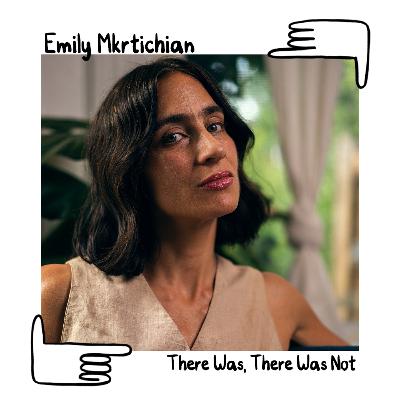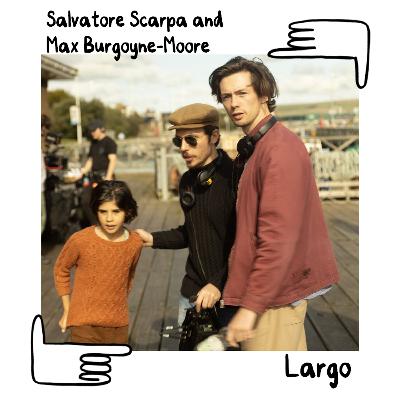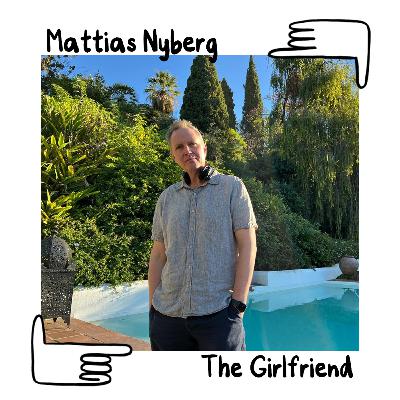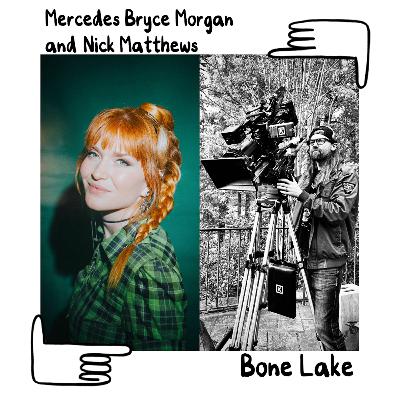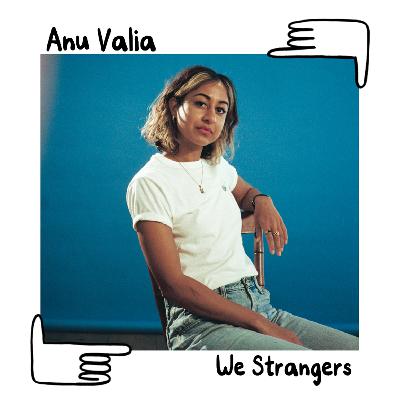Discover We Need to Talk About Oscar
We Need to Talk About Oscar

We Need to Talk About Oscar
Author: Áron Czapek
Subscribed: 1Played: 14Subscribe
Share
© 2025 We Need to Talk About Oscar
Description
We Need to Talk About Oscar offers in-depth interviews with filmmakers, actors, and industry professionals. Although inspired by titles you expect to be represented at the Oscars, our conversations extend to buzzy indie projects and TV shows, exploring both the technical aspects of filmmaking and the personal stories behind them.
134 Episodes
Reverse
Director Clint Bentley and cinematographer Adolpho Veloso join us to discuss 'Train Dreams,' their adaptation of the Denis Johnson novella. The filmmakers reflect on the origins of their collaboration and how their partnership shaped the translation of Johnson's spare, evocative prose into visual storytelling from both a writer-director and cinematographer's perspective.Our conversation explores their thoughtful use of inserts as a narrative device, revealing how these moments expand the film's emotional language. They discuss capturing Joel Edgerton's internal yet deeply meaningful performance, finding ways to externalize a character whose journey is largely solitary and introspective.Clint and Adolpho also delve into the relationship between cinematography and narration, examining how visual language can complement or carry the weight of voiceover. Their insights into the patience and adaptability required to bring this American frontier story to life make for essential listening for anyone interested in literary adaptation.
Director Simon Cellan Jones joins us to discuss 'The Family Plan 2,' the second installment of what has become a franchise following the 2023 hit. Simon reflects on the fruition of this sequel and the timeline between making the two films, revealing how quickly they moved from the first film's success to developing its follow-up.Our conversation explores how the family dynamics have shifted now that Dan's secret past has been uncovered. With everyone in on the truth, Simon discusses the challenge of finding new sources of tension and comedy without the original film's central engine. He shares his approach to blending action and violence with earnestness in a family-friendly movie, maintaining the balance that made the first film resonate with audiences.Simon also discusses the deliberate holiday setting and how Christmas in Europe provides both emotional warmth and high-stakes adventure. We wrap up with reflections on the possibility of a third film, as Simon weighs the excitement of continuing the Morgan family's story against the challenges of sustaining a franchise.(Photo: Courtesy of Lionsgate)
Director Emily Mkrtichian joins us to discuss 'There Was, There Was Not,' her documentary that began filming in 2016 and evolved in devastating ways no one could have anticipated. Emily opens up about the mythology embedded in the film's title, a traditional Armenian storytelling phrase, and how the story she set out to tell transformed from hopeful beginnings into a chronicle of war and survival as conflict erupted.Our conversation explores how Emily reckoned with this unpredictable evolution, documenting real trauma as it unfolded rather than the narrative she originally envisioned. She discusses her decision to center the film around four women, keeping them in focus as war began engulfing their lives.Emily reveals how maintaining this intimate perspective amid chaos became both a creative anchor and an ethical responsibility in bearing witness to these women's experiences.(Photo credit: Chris Natalie)
Cinematographer Seamus McGarvey joins us to discuss 'Die My Love,' his latest collaboration with director Lynne Ramsay. Seamus reflects on their decades-spanning friendship and creative partnership, revealing how Ramsay's unique filmmaking style continually reinvents cinema.Our conversation delves into the technical choices that define the film's aesthetic, particularly the decision to shoot on Ektachrome and employ day for night techniques. Seamus explains how these choices serve the narrative's psychological intensity and create the film's otherworldly atmosphere.Seamus also shares his philosophy on cinematic adaptation, emphasizing that the difference between projects isn't measured in scale but in transformation. He elaborates on how he becomes a different cinematographer with each director he works with, and indeed with each film, reshaping his approach to serve the unique demands of every story.(Photo credit: Kimberley French)
This time around we are joined by Mike Makowsky, creator of the limited series ‘Death by Lightning,’ about bringing the story of one of America’s lesser known presidents to the screen.Mike shares how he connected with Candice Millard’s book and what it took to get a 4-episode historical series made in the current TV landscape, where IP recognition often drives decisions.We also dig into comedy’s role in serious and tragic moments, and how humor shapes the way we process historical drama.(Photo credit: Jana Williamson)
Writer-director-actress Cherien Dabis joins us to discuss 'All That's Left of You,' a film following a Palestinian family across three generations of conflict. Cherien opens up about evacuating the production from Palestine to Cyprus, Greece, and Jordan just two weeks before filming began due to escalating violence.Our conversation explores how Cherien balanced writing, directing, and acting while managing this unprecedented crisis. She reveals how these interconnected roles informed one another and shaped her deeply embedded perspective on the storytelling.Cherien also reflects on the ongoing Gaza genocide and its impact on both the film and its narrative spanning the Nakba, the occupation, and the first Intifada. Selected as Jordan's Oscar entry for Best International Feature, the film stands as a testament to perseverance amid overwhelming adversity.
Writer-director John-Michael Powell joins us to discuss 'Violent Ends,' his southern crime thriller hitting theaters on Halloween. Powell opens up about the leap from his micro-budget debut 'The Send-Off' to this significantly larger production, sharing insights into navigating that scale shift.Our conversation explores John-Michael's extensive editing background and how it shaped his approach to directing. He discusses how his editorial experience allows him to move efficiently on set and make confident decisions about coverage. Powell also reveals the unique dynamic of now working with an editor after years behind the cutting room himself, and how that relationship informs his vision behind the camera.We delve into the film's intentional approach to violence and gore within action sequences, with him emphasizing their deliberate portrayal of violence as a rumination on its destructive nature.(Photo: Courtesy of Kai Caddy)
Co-directors Salvatore Scarpa and Max Burgoyne-Moore join us to discuss Largo, their short film about a young Syrian refugee in the U.K. that took nearly five years to develop. The filmmakers open up about the dynamics of their creative partnership, exploring how two voices shaped one vision, and what can be achieved within the constraints and creative possibilities of short film format.We dig into the film’s exploration of displacement and their choice to depict a reversal of migration, examining what it means to be caught between worlds. We also talk about the film’s festival journey, from HollyShorts to Oscar-qualifying platforms.
This time around, we talk with Cooper Raiff, the creator, director and star of the limited series ‘Hal & Harper,’ about navigating the indie scene on the TV side.Cooper breaks down one of the show’s central conceits: he and Lili Reinhart playing their characters as kids in certain scenes. We explore what it took to get into that childhood headspace and how those scenes shape the series.We also dig into what it’s like juggling multiple roles on a project, from directing and acting to editing, and how that creative control shapes his storytelling approach.(Photo credit: MUBI)
Filmmaker M.G. Evangelista joins us to discuss their horror short 'Anino,’ premiering at this year's NewFest. Our conversation explores the integral role of language in shaping their film's narrative and the ongoing search for identity that drives their work. M.G. opens up about their venture into genre filmmaking with this monster story, revealing how horror became a vehicle for exploring deeper personal themes.We also delve into the extensive development journey of their debut feature 'Burning Well,' which has been in progress for over five years. M.G. shares insights into the challenges and evolution of bringing this project to life, demonstrating the patience and persistence required in independent filmmaking.
Cinematographer Mattias Nyberg joins us to discuss his work on episodes 1-3 of 'The Girlfriend,' directed by Robin Wright. Mattias reveals what drew him to the project - the opportunity to collaborate with Wright, whose directorial vision he'd long admired - and how they developed a visual language that serves the story's emotional core.Our conversation explores Mattias's tailored approach to capturing the dual perspectives of Laura and Cherry, deliberately avoiding neutral shots to position viewers within each character's distinct emotional landscape. He discusses the technical challenges of shooting in constrictive yet stunning locations, from London's Sanderson house to a Spanish villa, where spatial limitations sparked creative innovation in camera movement and staging.Mattias delves into specific visual choices, particularly the hospital sequences where he introduced warm colors into typically sterile environments to enhance emotional complexity. His reflections on using extended shot lengths to build tension and deepen feeling demonstrate the delicate balance between technical precision and emotional storytelling.
Director Mercedes Bryce Morgan and cinematographer Nick Matthews join us to discuss 'Bone Lake,' a film that shifts the typical thriller focus from "whodunit" to exploring why chaos unfolds in the first place.Our conversation explores how Mercedes and Nick crafted a visual experience that subverts audience expectations, blending genres and pushing boundaries. Mercedes discusses the creative evolution that brought this twisted world to life, while Nick reveals his approach to creating imagery that serves the film's unpredictable narrative.(Photo: Courtesy of FLASCH)
Cinematographer Alexander Dynan joins us to discuss his work on 'The History of Sound,' tracing his collaboration with director Oliver Hermanus from their previous project 'Mary & George.' Alexander reveals how lessons from episodic filmmaking informed his feature approach, while acknowledging the distinct storytelling demands of each medium.Our conversation explores the film's ambitious temporal scope, spanning decades. From visual strategies for communicating the passage of time - from color grading choices to production design collaborations - showing how every element from costume to camera movement contributes to the film's emotional weight, alongside the unique challenge of visually representing musical performances.
This week, we sit down with director Ondi Timoner to talk about her documentary ‘All God’s Children,’ which follows the partnership between Congregation Beth Elohim and Antioch Baptist Church in Brooklyn.Ondi walks us through how the project began with her sister’s activism and the challenges of filming within sacred spaces while balancing her roles as both filmmaker and family member. We explore the messy realities of the partnership - including moments that threatened to fracture the alliance - and how both communities learned to thrive together.We also talk about her evolution as a documentary filmmaker and how she’s handling distribution through her production company Interloper Films.
This week, writer-director Carmen Emmi takes us through his creative process for ‘Plainclothes,’ where he threw technical perfection out the window to focus on raw, heartfelt storytelling.Carmen shares his journey from cinematographer to director, and how he navigated the transition from worrying about flawless shots to weaving a personal story that resonates with queer audiences. We talk about the film’s festival run, including stops at Sundance and Frameline, and the meaningful connections he’s made with peers and audiences along the way.(Photo: Courtesy of Magnolia Pictures)
Writer-director Bryn Chainey joins us to discuss 'Rabbit Trap,' his haunting exploration of how supernatural folklore mirrors our deepest human experiences. Bryn reveals his unique approach to using nature and the otherworldly as tools for confronting inner truths, tracing his thematic evolution from early work like 'Moritz and the Woodwose' to this latest feature.Our conversation centers on Bryn's innovative integration of sound and visuals, where he treats audio not as an afterthought but as the film's heartbeat. He explains how blurring the lines between music, sound design, and visual storytelling creates an immersive experience that resonates on deeply personal levels, emphasizing the crucial synergy between all filmmaking departments.(Photo: Courtesy of Magnet Releasing)
This week, we talk with cinematographer Bill Kirstein about his work on ‘Happyend,’ which premiered at the Venice Film Festival last year.Bill shares stories from his childhood, and how that rebellious spirit carries into his approach to filmmaking. We explore what draws him to projects where directors have bold visions that challenge conventional execution.Our conversation digs into the artistic choices behind Happyend, a near-future story about friendship set against impending disaster. Bill walks us through how constraints can actually fuel creativity, and breaks down his cinematographic approach - from color palette decisions to camera positioning - that helps immerse viewers in the film’s atmospheric world.(Photo credit: Eunhae Mary Park)
This week, we sit down with writer-director Anu Valia to talk about her feature debut ‘We Strangers,’ which premiered at SXSW 2024.Anu walks us through the journey from festival premiere to theatrical release, and how her relationship with the film has evolved along the way. We dig into the story of Ray, a woman navigating spaces where she feels like an outsider, and explore how Anu wove themes of identity, class, and belonging into her character’s journey.Coming from directing episodes of ‘Shrinking,’ ‘Never Have I Ever,’ and ‘The Afterparty,’ Anu also shares what it was like making the leap to feature filmmaking and the collaborative nature of indie storytelling.
Director Oliver Hermanus joins us to discuss 'The History of Sound,' drawing from his South African background to explore how cinema can foster empathy across divides. Oliver reflects on his commitment to creating narratives that invite audiences into unfamiliar perspectives, shaped by experiences in a country where marginalized voices were systematically silenced.Our conversation explores his collaboration with Ben Shattuck, who adapted his own short story despite having no screenwriting experience. Oliver reveals his supportive approach to this creative partnership and his thoughtful use of narration to enhance storytelling without overwhelming the visual medium.
Cinematographer Alex Disenhof joins us to discuss his work on HBO's limited series 'Task,' revealing the dramatic shift from the fantastical landscapes of 'The Lord of the Rings: The Rings of Power' to the gritty streets of Philadelphia. Alex opens up about his creative philosophy—that every project demands genuine emotional investment, and without that personal connection to the script, he simply cannot deliver his best work.Our conversation explores the nuanced art of genre transition, as Alex explains how he navigates between epic fantasy and intimate crime drama while maintaining his distinctive visual voice. We also discuss the challenge of creating intimacy within high-stakes action sequences, emphasizing his commitment to grounding viewers in the characters' emotional reality rather than relying on spectacle alone.Alex's approach to capturing both the weight of character studies and the intensity of crime narratives offers fascinating insights into contemporary cinematography. His thoughtful balance of philosophical reflection and hands-on technique demonstrates how visual storytelling can elevate material beyond surface-level drama.




